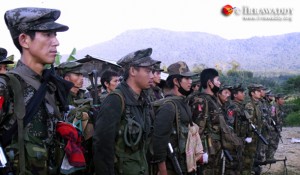A Long Way to Go for People in Burma’s Ethnic Areas
By Burma Partnership • July 23, 2012 Leaders of ten ethnic and opposition political parties met with President Thein Sein this week for the first time. The meeting in Naypyidaw afforded the opportunity for the MPs to raise key issues, including the rule of law, changes to the electoral system and peace building. However, the government’s response to an MP’s request for the inclusion of ethnic languages and literature in school curriculum was illustrative of how it views the rights of ethnic people and minorities.
Leaders of ten ethnic and opposition political parties met with President Thein Sein this week for the first time. The meeting in Naypyidaw afforded the opportunity for the MPs to raise key issues, including the rule of law, changes to the electoral system and peace building. However, the government’s response to an MP’s request for the inclusion of ethnic languages and literature in school curriculum was illustrative of how it views the rights of ethnic people and minorities.
Railway Minister and Thein Sein’s chief negotiator with armed ethnic groups, Aung Min, said that the government would allow teaching the Mon language and would provide US$1 million to fund it. However, Banyar Aung Moe, an Upper House MP for the All Mon Regions Democracy Party said, “[Aung Min] told us that the teaching time would be out of school hours. I am not satisfied with this as our party proposed allowing teaching in the government’s school time.”
Also this week, the speaker of the Lower House of Parliament, Shwe Mann, reportedly told Banyar Aung Moe that the government agrees to set up a federal union at some point in the future in order to achieve peace. However, when looking at the reality that ethnic people face, it is easy to take such comments as those from Aung Min and Shwe Mann as little more than empty placations.
Ethnic political parties continue to face challenges to their participation in the democratic process. In May, the Union Election Commission (UEC) rejected the 1990 election winning Zomi National Congress’ application to register as a political party because the government does not recognize the Zomi as an ethnic group. The Zomi National Congress was subsequently allowed to register with a new name, the “Zomi Congress for Democracy.” However, the removal of the sensitive word, “national” from the party’s name does not change the fact that the Zomi are not a recognized ethnic group, despite having submitted extensive documentation in support of their distinct identity to the UEC.
The Kachin State Progressive Party (KSPP) is another ethnic party that has been denied the opportunity to participate in Burma’s supposedly democratic process. After being denied registration in 2010, the KSPP registered to run in this year’s April by-elections only to have polls cancelled in the three constituencies to be contested in Kachin State. The government and its negotiators have repeatedly said that the political issues of ethnic nationality groups should be addressed in the Parliament, however, many ethnic political parties have not been allowed to contest in past elections.
Foreign investment and peace funds are being given the green light to go ahead in ethnic areas, without any effort to ensure transparency or the participation of affected communities. Each week there are cases of people being forced off their land without adequate information to make informed decisions or appropriate compensation. Moreover, the new Farmland Bill, rather than protecting the rights of the people and their livelihoods instead enables the government to continue to confiscate any land under the pretext of “the national interest.”
In the last month, armed clashes have occurred in many ethnic areas, including Shan, Karenni and Karen States. The Kachin Independence Organization Spokesperson La Nan said that the fighting in Kachin State is escalating with the Burma Army sending in reinforcements and closing in on Bhamo, Muse and the Kachin Independence Army’s headquarters in Laiza.
Martial law continues in Arakan State making it difficult to obtain a comprehensive understanding of the current situation on the ground, including the case of detained international aid workers, the number of casualties and the needs of displaced people. However, Rohingyas continue to try to flee to Bangladesh and report of the Burma Army raiding a village and abducting young Rohingya men. As Ekmeleddin Ihsanoglu, the Secretary General of the Organization for Islamic Cooperation, said in a recent statement, “[Burma] should recognize that its new engagement at the international level doesn’t only come with opportunities but also with responsibilities.”
Indeed, there is a long way to go for Burma’s ethnic nationalities and minorities. The UK Foreign and Commonwealth Office said in its annual Human Rights and Democracy Report that minority rights “remained perhaps Burma’s greatest challenge, requiring … constitutional amendments.” The UK and the international community must put pressure on the Thein Sein government to address not only the rights of indigenous ethnic nationalities but also the rights of minorities, and ensure that the constitution and laws protect the rights of all the people within Burma’s borders.
Tags: Arakan State, Arakan/Rakhine, Burma Partnership, Ethnic Nationalities, RohingyaThis post is in: Blog
Related PostsU.S.: Lifting Sanctions on Myanmar Puts Human Rights Progress At Risk
Advisory Commission on Rakhine State – A Welcome Investigation into Arakan State’s Human Rights and Humanitarian Crisis
NLD Government Must Lift All Aid Restrictions in Arakan State
United States Commission on International Religious Freedom – Burma: 2016 Annual Report
(၂၉) ႏွစ္ေျမာက္ စစ္ေတြဆန္ျပႆနာေန႔ ဝမ္းနည္းေအာက္ေမ့ဖြယ္ အထိမ္းအမွတ္ သေဘာထားထုတ္ျပန္ခ်က္









 All posts
All posts